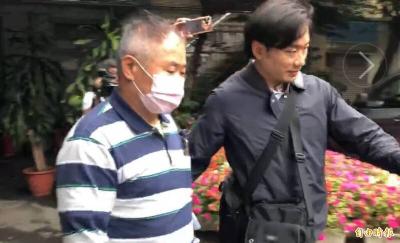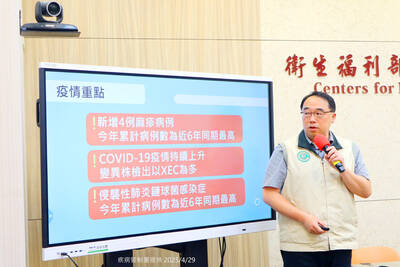A legislative committee yesterday approved a draft bill regulating the handover of the presidency, which empowers the incumbent president and the president-elect to form an ad hoc team to handle the transition.
The Judicial, Organic Laws and Statutes Committee passed the preliminary review of the bill governing the handover procedure for the presidency and vice presidency. The bill will proceed to the plenary legislative sitting for its second reading without further negotiations.
There was prolonged debate over who should supervise the handover procedure before committee members reached an agreement yesterday.
The draft submitted by the Chinese Nationalist Party (KMT) proposed giving the job to the Judicial Yuan, but Judicial Yuan Secretary-General Hsieh Wen-ting (謝文定) said that this would violate the yuan’s constitutional duty.
Democratic Progressive Party (DPP) Legislator Wong Chin-chu (翁金珠) proposed replacing the supervisory body with an ad hoc commission to be formed within seven days of the Central Election Commission (CEC) formally promulgating the election result, led by someone appointed by the incumbent president.
DPP committee members said the president-elect should be able to choose the commission’s leader.
The committee then agreed to form an 11-person commission with the president-elect appointing the group leader and half of the 10 members, and the incumbent president appointing the remaining five.
Under the draft bill, the president and vice president-elect would establish a temporary office to handle the handover after the Central Election Commission (CEC) formally promulgates the election result. The handover office would be dissolved after the transition was completed.
Under the proposed law, the incumbent president and vice president would be banned from making any new Cabinet appointments after the CEC promulgates the election results and the premier and ministers must abide by the proposed law as well.
During the pre-inaugural period, all policies that have not been implemented, plus all decrees, international treaties and special budgets considered controversial by the president-elect must be put on hold.
The draft also outlines the items the outgoing president must hand over to his or her successor, including documents concerning national defense, foreign affairs and cross-strait relations. Violations that involved in penal offenses would be subject to criminal investigation.
Meanwhile, the Presidential Office denied speculation yesterday that it had bought 57 shredders to depose of sensitive documents before the handover.
KMT Legislator Lu Hsueh-chang (呂學樟) said he wondered why the Presidential Office needed 123 shredders for its 359 staffers.

A fugitive in a suspected cosmetic surgery fraud case today returned to Taiwan from Canada, after being wanted for six years. Internet celebrity Su Chen-tuan (蘇陳端), known as Lady Nai Nai (貴婦奈奈), and her former boyfriend, plastic surgeon Paul Huang (黃博健), allegedly defrauded clients and friends of about NT$1 billion (US$30.66 million). Su was put on a wanted list in 2019 when she lived in Toronto, Canada, after failing to respond to subpoenas and arrest warrants from the Taipei District Prosecutors’ Office. Su arrived at Taiwan Taoyuan International Airport at 5am today on an EVA Air flight accompanied by a

A 79-year-old woman died today after being struck by a train at a level crossing in Taoyuan, police said. The woman, identified by her surname Wang (王), crossed the tracks even though the barriers were down in Jhongli District’s (中壢) Neili (內壢) area, the Taoyuan Branch of the Railway Police Bureau said. Surveillance footage showed that the railway barriers were lowered when Wang entered the crossing, but why she ventured onto the track remains under investigation, the police said. Police said they received a report of an incident at 6:41am involving local train No. 2133 that was heading from Keelung to Chiayi City. Investigators

The Keelung District Prosecutors’ Office today requested that a court detain three individuals, including Keelung Department of Civil Affairs Director Chang Yuan-hsiang (張淵翔), in connection with an investigation into forged signatures used in recall campaigns. Chang is suspected of accessing a household registration system to assist with recall campaigns targeting Democratic Progressive Party (DPP) city councilors Cheng Wen-ting (鄭文婷) and Jiho Chang (張之豪), prosecutors said. Prosecutors yesterday directed investigators to search six locations, including the Chinese Nationalist Party’s (KMT) Keelung office and the residences of several recall campaign leaders. The recall campaign leaders, including Chi Wen-chuan (紀文荃), Yu Cheng-i (游正義) and Hsu Shao-yeh

COVID-19 infections have climbed for three consecutive weeks and are likely to reach another peak between next month and June, the Centers for Disease Control (CDC) said yesterday. Weekly hospital visits for the disease increased by 19 percent from the previous week, CDC Epidemic Intelligence Center Director Guo Hung-wei (郭宏偉) said. From Tuesday last week to yesterday, 21 cases of severe COVID-19 and seven deaths were confirmed, and from Sept. 1 last year to yesterday, there were 600 cases and 129 deaths, he said. From Oct. 1 last year to yesterday, 95.9 percent of the severe cases and 96.7 percent of the deaths